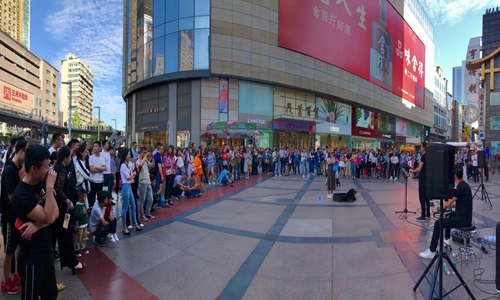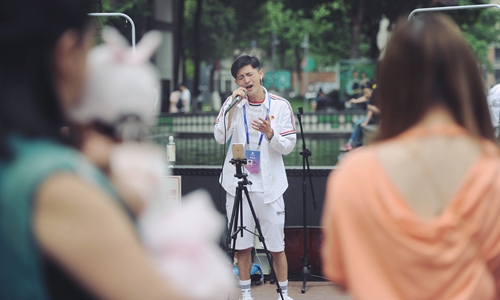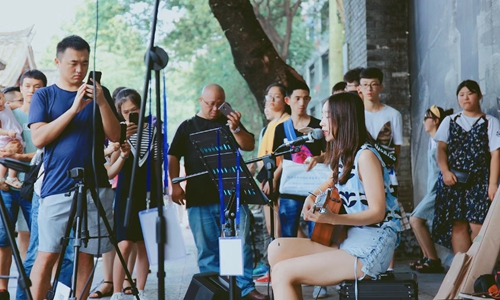China’s street vendor policy may encourage emergence of street artists
By Chen Xi Source:Global Times Published: 2020/6/4 22:23:41

People enjoy a street artist's performance near a shopping mall in Chengdu, Southwest China's Sichuan Province before the outbreak of COVID-19. Photo: Courtesy of Chengdu Culture Center
More Chinese artists might take to the streets for performances now that the Chinese government has loosened its grip on street vendors in order to boost the economy amid the COVID-19 pandemic, an official of China's culture department said on Thursday.
In 2018, Chengdu, Southwest China's Sichuan Province, became one of the earliest cities in China to launch a street culture program, themed " a city with music." Now, in light of the improved domestic COVID-19 situation, street artists in Chengdu have begun to resume their performances, bring back vitality to the city.
"The supporting street vendor policy and the performances of street artists could become a win-win strategy benefiting the local economy," Zhao Liangliang, an official of the Chengdu Culture Center, told the Global Times on Thursday.
She added that the project has matured nicely over the past two years.
"Some officials from cities including Zhuhan city in South China's Guangdong Province and Jinan city in East China's Shandong Province have come here for a visit and communication, and they are considering the possibility of implementing the program in their cities," Zhao said.
According to reports, a total of 27 cities in China are promoting the development of street vending. Many Chinese netizens have shown their support of these programs and have further called for the promotion of street artist culture as well.
"We could learn from some Western countries to include more street entertainers in addition to street vendors," a Chinese netizen posted on Sina Weibo.

Street artist Chen Huan Photo: Courtesy of Chen Huan
Chen Huan, better known by his street artist name Hot Pot Brother, has been a street singer for a year and a half. He told the Global Times on Thursday that in Chengdu, only artists who have a street art performance license are allowed to perform at the 60 designated location around the city, most of which are hot scenic spots or shopping centers. Like street artists in Western countries, Chinese street artists perform for tips.According to Zhao, artists can apply for four types of performance - vocal performances, instrumental performances, intangible cultural heritage handicrafts and storytelling. Applicants need to submit their CV first and then undergo an interview process in which they must perform in front of professional artists.
She added that the artists usually perform on Fridays and weekends from 5pm to 9pm.
While singing for two hours may sound exhausting to many people, Chen said that it makes him very happy.
"I really like singing on the street. I feel much more relaxed compared to singing on TV. I sometimes lose track of time when putting my all in a performance," Chen said, noting that one of the most rememberable signs he was doing well was when the audience gave him a total of eight bottles of water during a show.

Street artist Du Jingping Photo: Courtesy of Du Jingping
Du Jingping, better known as Du Yuanqi, is one of the first batch of street artists in Chengdu. She told the Global Times on Thursday that she often changes her songs depending on the day's weather or the theme of some public holidays."For example, when I knew I was going to perform on Children's Day, I prepared some songs that children like," she said, adding that it was very convenient for people to check what performances are available on an app created by the Chengdu Culture Center.
She noted that she has also been feeling a bit of pressure as the quality of street artists has improved.
"We have about 200 to 300 street artists in Chengdu and some of them have even participated in some popular music TV shows."
Both Chen and Du said the number of audiences now that they are performing again has dropped somewhat, but that they are still excited to be back on the streets and helping create an atmosphere for residents.
Posted in: RELATIONSHIPS,CULTURE & LEISURE,ARTS FOCUS